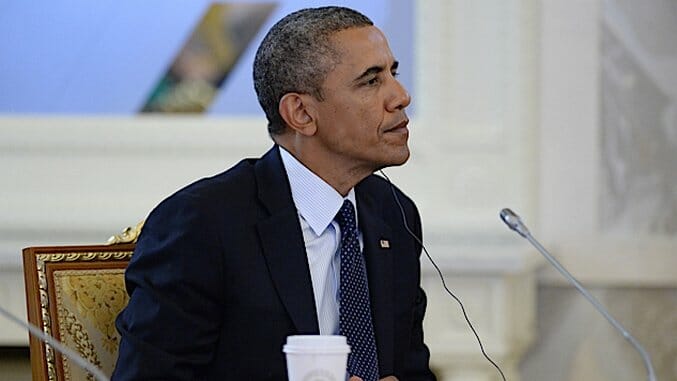The Russia Conundrum: How Can Democrats Avoid Getting Entangled in a Losing Issue?

On Thursday, President Obama retaliated against Russia for interfering with the United States’ election. He removed from the US nine entities and two people, all of whom were, per the White House’s press release, involved in Russian attempts to undermine the United States’ election. Obama further claimed that there may be more sanctions on the way, although they would be covert.
In turn, Russia has promised that it will strike back with its own sanctions against the United States. If Russia’s sanctions are similar to Obama’s, then they will be more symbolic than harmful, at least in the moment. Russia and the United States throwing sanctions back and forth, even sanctions that are not particularly potent, could have destabilizing effects, however, and this is a development that should worry everyone. The United States is probably the most powerful player on the world stage; while Russia is not as sturdy as it once was, it still holds a fair bit of international capital; these two countries feuding would have terrible effects not just for the citizens of both countries, but also for—perhaps especially for—the citizens of smaller countries that are manipulated by the two powers.
Most worrying is that the cause of the sanctions is still opaque. Obama has claimed that intelligence agencies, such as the CIA and FBI, have assured him Russia was intent on interfering in the United States’ election, yet there is precious little hard evidence on the table. This has not stopped war mongering politicians, like the ever bloodthirsty John McCain and Lindsay Graham, a duo of destruction, from calling for Obama to increase sanctions against Russia.
Make no mistake: if Russia used cyber warfare to attack the United States’ elections then that is a crime and a direct threat to democracy. But right now there is scant proof of it and one could be forgiven for walking away from today’s new stories feeling uncertain as to whether Russia directly hacked voting machines (there is no proof of this) or merely helped leaked emails (there is some proof of this, but calling it “election interference,” while perhaps technically accurate, certainly sounds over the top). Curiously, Obama’s press release gives no hard details on what Russia did, which makes it rather difficult to figure out whether the sanctions are appropriately strong and whether the Democrats should be up in arms. But up in arms they are.
The Democrats have latched onto the narrative that Putin personally installed Donald Trump as president after Hillary Clinton’s stunning loss in November. It’s an attractive narrative, in a way. It makes Trump out to be a Manchurian candidate, it means that Hillary Clinton did not really lose, and it means that the Democrats do not need to reevaluate the way they run their campaigns. There’s comfort in this, because it means they did nothing wrong and are simply victims of an evil foreign power out to manipulate the United States.
As attractive as this narrative may be, it is also incredibly dangerous for the Democrats’, and thus the United States’, future. Since 2008, Democrats have suffered humiliating losses down ticket despite Obama’s 2012 win. As far as I can tell, none of the House and Senate races have been influenced by Russian sleeper cells, which means even if Putin himself pulled levers for Trump in Wisconsin, the Democrats need to overhaul their way of campaigning and develop a consistent message that is attractive to the American people so that Trump does not have a stranglehold on the country for the next eight years. By focusing on Russia, the Democrats are losing precious time; the 2018 midterm elections are not far away and, considering how many Democratic senators are up for re-election, it is imperative that the Democrats begin preparations.
Additionally, the Democrats need to decide just how far they want to push the Russia narrative to undermine Trump. Undermining Trump is a worthwhile goal—he is a disgusting capitalist fat cat whose presidency will, if given a blank check, rob millions of Americans of needed health care and financial benefits—but undermining Trump by making difficult to substantiate claims about Russia is a questionable approach.
-

-

-

-

- Curated Home Page Articles By Test Admin October 21, 2025 | 3:10pm
-

- Curated Home Page Articles By Test Admin October 21, 2025 | 2:57pm
- Urls By Test Admin October 21, 2025 | 2:57pm
- Curated Home Page Articles By Test Admin October 21, 2025 | 2:55pm
-

-

-

-

-

-

-

-

-

-

-

-

-

-

-

-

-

-

-

-

-

-

-

-

-

-

-

-

-

-

-




































